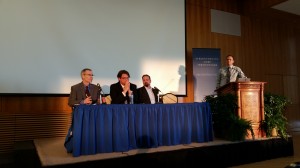The director of the National Marriage Project said marriage makes men work harder, smarter and more successfully.

Faculty members, staff and students gathered March 19 in the Hinckley Center Assembly Hall as the Wheatley Institution hosted its first annual Wheatley roundtable on the family.
University of Virginia sociology professor W. Bradford Wilcox shared research showing that married men work 400 hours more a year than do their unmarried peers.
“It’s not that they are just working more, they are working more strategically,” Wilcox said.
Wilcox shared the example of Douge Talbee, a 37-year-old male from Ohio whom he interviewed during his study. Talbee said that before he was married, he didn’t have a care in the world. He was happy living in his parents’ basement and didn’t have a desire to go to college. After he was married and had kids, things changed for Talbee.
“I had to step up and think about something besides myself and start taking care of them,” Talbee said. “It’s my responsibility to work hard once I took the vows of marriage.”
Wilcox explained that this is common throughout the world. Marriage affects men across racial and education lines. Once men are married they tend to settle down and do better at work.
“Married men are much less likely to quit their current job without lining up a new job, and married men are also less likely to be fired,” Wilcox said.
Married men have been found to make more money, and the trend is the same for less-educated men. Wilcox said the gap between men who didn’t go to college and are married compared to their peers who didn’t go to college and are single is actually larger than those men who are educated.
“Some argue that there is a ‘marrying type’ and it is all about selection, but I don’t believe that is entirely true,” Wilcox said. “It’s not only about selection.”
Wilcox spoke about a twins study conducted in Minnesota that found married twins earned 26 percent more than their identical twins who were not married.
Wilcox acknowledged that there is an effect on women as well but that the effect is not as significant.
“Women are transformed more by parenthood than by marriage, and men are transformed more my marriage than by parenthood,” Wilcox said.
The idea that the male is the breadwinner is still alive, Wilcox said. Even today, men and women typically assume men will be the breadwinner after marrying. More than two-thirds of family income comes from the husband.
Marriage also causes men to settle down and can be considered a rite of passage, Wilcox said.
“Getting married tempers man’s taste for risk,” Wilcox said. “They engage in less risky behavior and go to the doctor more often when they have the counsel and support of a wife.”
Marriage makes the man, Wilcox said, but there are more men every year who are not getting married or are postponing marriage. He gave four ways that this trend can be stopped: (1) welfare polices discourage individuals from getting married, (2) there should be increased support for vocational education and apprenticeships, (3) the government should boost low-income wages and child tax credit and (4) there should be a cultural campaign supporting fatherhood and marriage for men.
“Our government shouldn’t be penalizing marriage; they need to be encouraging it,” Wilcox said.
More information on the studies Wilcox shared can be found on family-studies.org.




